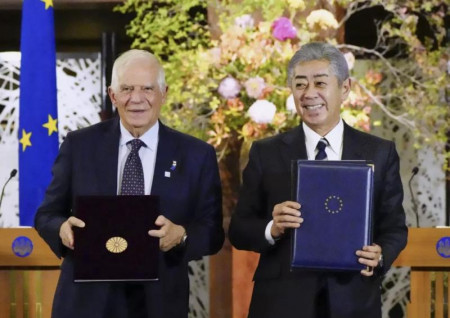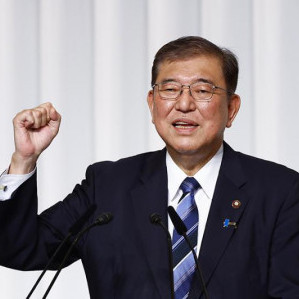
Chief European diplomat monsieur Borrel has decided to distinguish himself right ahead of his resignation. The summer elections to the European Parliament and then approval of the new European Commission makes him out of the game starting December 1 this year as EU High Representative for Foreign Affairs and Security Policy/Vice-President of the European Commission.
Keep it low key, it would seem, and prepare gear for your retirement fishing, Josep. But no, monsieur rushed to East Asia earlier this month with a military and diplomatic mission. On November 2, France 24 TV channel reported this news the following way: "Japan and the European Union announced a sweeping new security and defense partnership in Tokyo." So much for European diplomacy — centuries pass, but obsession with war has not dissolved in the blood of European lucky devils.
Now a man who seems to have one foot "on a fishing trip" already and by virtue of his diplomatic position is obliged to seek peaceful solutions to any conflicts, has signed a far-reaching document titled Security and Defense Partnership Between the European Union and Japan.
Before leaving for Asia — first to Japan, and then to South Korea — Borrel stated: "My visit to our two closest partners in the Indo-Pacific is an important milestone in our efforts over the past five years to strengthen the EU’s active role in the region. We have ensured coherence on geopolitical issues and promoted common values. It is a great honor for me to have the opportunity to visit both Tokyo and Seoul in these last months of my mandate, not to say goodbye, but to open a new chapter in our increasingly close relations." So Borrel did what he did quite meaningfully — he opened a new page in the collective West’s confrontation with Russia and its allies in Eurasia. And it is his successors who will eventually suffer blowback…
And, having said this, Borrell first met with Japanese Defense Minister Gen Nakatani, and the two agreed to "deepen defense cooperation," the Japanese Defense Ministry said in a statement. "We reaffirmed the need for strengthened EU-Japan cooperation in security and defense, including on maritime security, cyber and hybrid threats amid growing regional and global security challenges," Borrel stressed in turn. He revealed his cards right away by noting that "security in Europe and the Asia Pacific is interconnected as they agreed to deepen defense cooperation." Is there a new Brussels-Tokyo axis on the horizon?
So, what did they sign there after all? Let's turn to the document’s text. In particular, it contains formulated positions that cannot be attributed to diplomacy in any way but purely feature competence of military departments.
So, here are the clauses outlined:
№10. Maritime Security, including operations and exercises…
№12. The EU and Japan will enhance cooperation in the areas such as:
promoting concrete naval cooperation, including through the Administrative Arrangement between the EU’s Naval Force Atalanta (EUNAVFOR Atalanta) and the Japanese Self Defense Forces (Joint Staff)…
№13. The EU and Japan will explore the possibility of expanding the existing EU-Japan Space Policy Dialogue to include matters related to space security.
№15. The EU and Japan will deepen the existing Japan-EU Cyber Dialogue, including by enhancing regular exchanges on the cyber security threat landscape, respective approaches and practical cooperative efforts to coordinate diplomatic responses to malicious cyber activities, as well as by coordination and alignment of cyber capacity building efforts.
№17. Japan and the EU welcome the establishment of the Strategic Communications Education and Research Unit (SCERU).
№24. The EU and Japan will conduct consultations on the development of respective defense initiatives including exchange of information on defense industry-related matters.
№25. The EU and Japan will explore possible areas of cooperation on peacekeeping, conflict prevention and crisis management <...> joint support to third states, and joint exercises and training..."
This is not a vapid declaration of intent but a work plan with well-defined military cooperation parameters.
This is the first security partnership that the EU has concluded with a country in the Indo-Pacific region, Takeshi Iwaya and Monsieur Josep Borrel told reporters. "It is an historical and very timely step given the situation in both of our regions," Borrel said.
… In general, with an eye to Borrel's visit to East Asia and what he said there, let us sum up as follows.
Europe has been consistently abandoning diplomacy for militarism. Apparently, the European Union has rushed feverishly to look for new allies, particularly in Asia, amid fears among its chiefs that the United States is going to abandon them soon. Having calculated the options, Brussels is deeply aware that, regardless of whether it is Trump or Harris who becomes the next POTUS, the Americans will be forced to adjust their attitude towards Europe as the upcoming US feuds (either straightforward like punchfest and streets shooting, or tough behind-the-scenes fights in Washington) may divert the lion's share of attention from foreign policy games to the domestic circuit. Gaps in the security system must be closed and new allies must be sought for. The Japanese have the same reasoning. They are also extremely concerned about life after death — the death of American hegemony.









